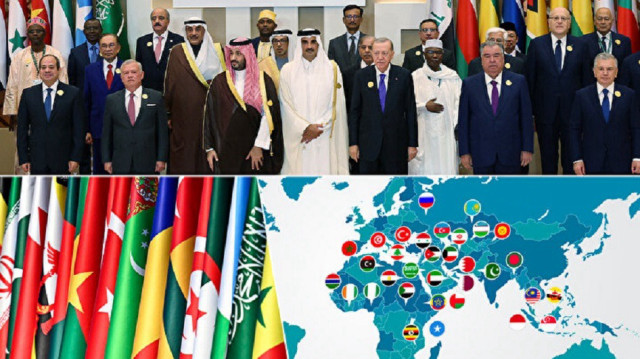
As Israel continues its assaults on Gaza and Iran, Istanbul is once again hosting a crucial diplomatic event. Under the theme "The OIC in a Changing World", the 51st session of the CFM convenes on June 21–22, drawing global attention back to Türkiye.
The 51st Session of the Council of Foreign Ministers (CFM) of the Organisation of Islamic Cooperation (OIC) kicked off at the Lütfi Kırdar International Convention and Exhibition Center in Istanbul, hosted by Türkiye’s Foreign Minister Hakan Fidan.
The OIC was founded in response to the arson attack on Al-Aqsa Mosque in 1969, reflecting the outrage felt across the Muslim world at the time. Since then, the organisation has continued its work, representing a vast geography inhabited by 1.7 billion Muslims—roughly one-quarter of the global population.
OIC member states hold 66% of the world’s crude oil reserves and 60% of its natural gas reserves. Despite this resource wealth, their share in global production is 10.6%, in exports 10.1%, and in foreign direct investment just 11.3%. Yet bloodshed and suffering persist across the Islamic world. The ongoing atrocities in Gaza since October 7, 2023, and the recent attacks on Iran serve as harsh reminders that the Islamic world must rise, unify, and act. Salvation lies in becoming a single, united pole of power.
As Israel continues its assaults on Gaza and Iran, Istanbul is once again hosting a crucial diplomatic event. Under the theme "The OIC in a Changing World", the 51st session of the CFM convenes on June 21–22, drawing global attention back to Türkiye.
The OIC was formed during a summit in Rabat between September 22–25, 1969, shortly after the attack on Al-Aqsa Mosque. Today, around 60% of the populations in OIC countries are under the age of 24—making it a young and dynamic bloc.
This demographic strength adds urgency to addressing the deep humanitarian crises across Muslim regions. With a population of nearly 2 billion spread across a vast geography, the Muslim world must recognize its own potential and rise to meet its challenges.
Addressing the summit, President Recep Tayyip Erdoğan delivered a historic speech, stating:
"When it comes to our shared causes, it is our duty to stand together. The Islamic world, now nearly 2 billion strong, must become a unified pole of power. We are on the brink of a new era—one in which the Muslim world must take on a far greater role."
Türkiye, a founding member of the OIC, has long contributed to the organisation’s work and hosted numerous major events. The 51st session of the CFM is expected to be one of the largest in the organisation’s history, with approximately 1,000 participants and record-level high-ranking attendance.
Delegations from 43 countries will be headed by ministers, and 5 by deputy ministers. In addition to OIC affiliate institutions, representatives from about 30 international organisations—including the United Nations, the Arab League, the Gulf Cooperation Council, the Organization of the Black Sea Economic Cooperation, D-8, the Economic Cooperation Organization, the Organization of Turkic States, the International Organization for Migration, and the World Trade Organization—will attend.
Roughly 200 local and international journalists are covering the summit. For the first time, an extraordinary session of the Arab League’s Council of Ministers will also take place in Türkiye, marking the first Arab League meeting ever held in the country.
Türkiye previously hosted CFM meetings in 1976, 1991, and 2004, making this its fourth time. Türkiye also became the first country to establish a permanent representation to the OIC in Jeddah in 2015 and hosted the 13th Islamic Summit at the heads-of-state level in 2016.
During the 2016–2019 term, Türkiye held the rotating presidency of the Islamic Summit and hosted two Extraordinary Summits in 2017 and 2018.
Following the arson attack on Al-Aqsa Mosque in August 1969, Muslim nations convened in Rabat, Morocco, for the first Islamic Summit. There, the Organisation of the Islamic Conference (OIC) was established—later renamed the Organisation of Islamic Cooperation in 2011.
With 57 member states and 5 observer countries across four continents, the OIC is the second-largest intergovernmental organisation after the United Nations. The Turkish Republic of Northern Cyprus has been an observer since 1979. Türkiye was one of the 25 founding members.
Representing 1.7 billion Muslims, the OIC comprises a young and growing population, with 60% under the age of 24. OIC countries possess immense resources—66% of global crude oil and 60% of gas reserves—but remain underrepresented in global economic power structures.
Headquartered temporarily in Jeddah, the OIC has 41 subsidiary, affiliated, and specialized institutions, along with 4 standing committees. One of them, the Standing Committee for Economic and Commercial Cooperation (COMCEC), is chaired by President Erdoğan himself.
Türkiye also hosts eight OIC-related institutions—second only to Saudi Arabia—highlighting its central role in the organisation.







